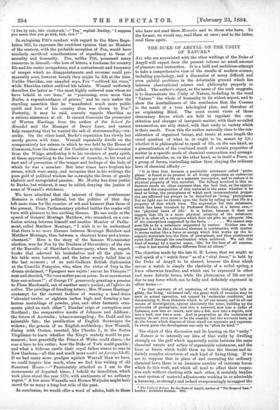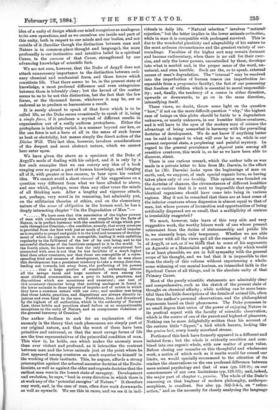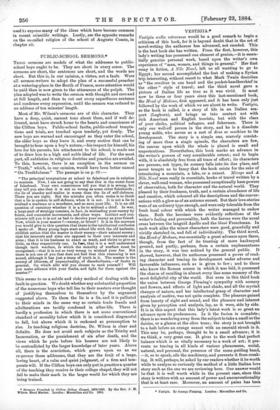THE DUKE OF ARGYLL ON THE UNITY OF NATURE.* ALL
who are acquainted with the other writings of the Duke of Argyll will expect from the present volume no small amount of pleasure and instruction. It is a bold and ambitious attempt to take a comprehensive view of the results of modern science, including psychology, and a discussion of many difficult and even painful problems in the debateable ground which lies between observational science and philosophy properly so called. The author's object, as the name of the work suggests, is to demonstrate the Unity of Nature, including in the word " Nature " the whole of humanity in its widest aspect, and to show the inevitableness of the conclusion that the Cosmos is the result of a trite teleological plan, and therefore of an originating Mind. The most recent views of those elementary forces which are held to regulate the con- stitution and changes of inorganic matter, with their so-called transmution, are ably stated, with that unity in variety which is their result. From this the author naturally rises to the con- sideration of organised beings, and treats at some length the
vexed question of what is, or ought to be, meant by life; whether it is philosophical to speak of life, on the one hand, as a generalisation of the combined result of certain properties of matter in a specific mode of chemical composition and arrange- ment of molecules, or, on the other hand, as in itself a Force, or a group of forces, controlling rather than obeying the ordinary
laws of chemical affinity :—
"It is thus that because a particular substance called 'proto- plasm' is found to be present in all living organisms, an endeavour follows to get rid of life as a separate conception, and to reduce it to physical property of this material. The fallacy involved in this en- deavour needs no other exposure than the fact that, as the appear- ance and the composition of this material is the same whether it be dead orliving, the protoplasm of which such transcendental proper- ties are affirmed has always to be described as 'living' protoplasm. But no light can be thrown upon the facts by telling us that life is a property of that which lives. The expression for this substance, which has been invented by Professor Huxley, is a better one,— the 'physical basis of life.' It is better, because it does not suggest that life is a mere physical property of the substance. But it is, after all, a metaphor which does not give an adequate idea of the conceptions suggested by the facts We cannot sup- pose life to be a substance supported by matter. Neither can we suppose it to be like a chemical element in combination with matter. It seems rather like a force or energy which first works up the in- organic materials into the form of protoplasm, and then continues to exert itself through the combination when achieved. We call this kind of energy by a special name, life,' for the best of all reasons, —that it has special effects different from all others."
The objection made by the late G. H. Lewes, that we might as well speak of a "watch force" as of a" vital force," is held by the Duke of Argyll to be absurd, because the force which moves a watch is simply the elasticity of a coiled spring, a force otherwise familiar, and which can be expressed in other and more definite terms, while the phenomena of life are not due to any force which can be fully and definitely expressed in other terms :—
"In that mystery of all mysteries, of which biologists talk so glibly, the living, nucleated cell,' the great work of creation may be seen in actual operation, not caused by molecular condition,' but determining it, from elements which to all our senses, and to all our means of investigation, appear absolutely the same, building up the molecules of protoplasm, now into a seaweed, now into a cedar of Lebanon, now into an insect, now into a fish, now into a reptile, now into a bird, now into a man. And in proportion as the molecules of matter do not even seem to be the masters but the servants here, so do the forces which dispose of them stand out separate and supreme. In every germ the development can only be after its kind."
The object of this discussion and its bearing on the " unity " of Nature is to intensify our idea of that unity by dwelling strongly on the gulf which apparently exists between the mere chemical nature and action of organisable substances, and the force or forces which build them up into the tissues and in- finitely complex structures of each kind of living thing. If we are to suppose that in place of and overruling the ordinary chemical laws, there is an immense number of intricate forces which do this work, and which all tend to effect their respec- tive ends without clashing with each other, it certainly implies a vast system of material adjustments working in so admirable a harmony, as strongly and indeed overpoweringly to suggest the
• Ths Unity London : Alexan of Nderiitrahanature. By . 1881.tbe Duke of Argyll, Author of " The Reign of Law." idea of a unity of design which cur mind recognises as analogous to its own operations, and as we ourselves are inside and part of this unity, both in respect to our minds and our bodies, and not outside of it (familiar though the distinction between man and Nature is in common-place thought and language), the more profoundly is our instinctive and intuitive belief in a spiritual Cause, in the oneness of that Cause, strengthened by our advancing knowledge of scientific fact.
We are not sure, however, that the Duke of Argyll does not attach unnecessary importance to the distinction between ordi- nary- chemical and mechanical force, and those forces which constitute life. That there seems to be, in the present state of knowledge, a most profound difference and even antagonism between them is tolerably clear; but the kernel of the matter seems to us to be not this distinction, but the fact that the few forces, or the thousand forces, whichever it may be, are so endowed as to produce so harmonious a result.
It is surely absurd to speak of that force which is to be called life, as the Duke seems occasionally to speak of it, being a single force, if it produces a myriad of different results in organisation out of a really uniform protoplasm. Either the protoplasm is infinitely varied, in a manner beyond our ken, or the one force is not a force at all in the sense of such forces as heat or electricity, but means simply the direct action of the .Divine Will. This last idea, however, involves considerations of the deepest and most abstract nature, which we cannot here enter upon.
We have given the above as a specimen of the Duke of Argyll's mode of dealing with his subject, and it is only by a few such examples that we can convey any idea of a book ranging over so great a part of human knowledge, and bringing all of it, with greater or less success, to bear upon his central idea. We cannot avoid a short resumg of his suggestions on a question very different from what we have alluded to above, and one which, perhaps, more than any other vexes the minds of all thinking men. After a lengthy and vigorous attack, not, perhaps, very novel in its reasoning, but admirably put, on the utilitarian theories of ethics, and on the elementary nature of the sense of obligation in the human soul, he has a deeply interesting chapter "On the Degradation of Man I I We have seen that this association of the higher powers
of man with rudimentary data which are supplied by the facts of Nature, is in perfect harmony with the condition of things which pre- vails throughout Creation,—the condition, namely, that every creature is provided from the first with just so much of instinct and of impulse as is requisite to propel and guide it in the kind and measure of develop- ment of which its organism is susceptible, leading it with unfailing regularity to the fulfilment of the law of its own being, and to the successful discharge of the functions assigned to it in the world. In the fourth place, we have seen that the only really exceptional fact connected with man is not that he has faculties of a much higher kind than other creatures, nor that these are susceptible of a corre- sponding kind and measure of development, but that in man alone this development has a persistent tendency to take a wrong direction, leading not towards, but away from, the perfecting of his powers
that a large portion of mankind, embracing almost all the savage races and large numbers of men among the most civilised communities, are a prey to habits, practices, and dispositions which are monstrous and unnatural; one teat of this unnatural character being that nothing analogous is found in the lower animals in those spheres of impulse and of action in which they have a common nature with our own ; and another test being that these habits, practices, and dispositions are always directly in- jurious and even fatal to the race. Forbidden, then, and denounced by the highest of all authorities, which is the authority of Natural Law, these habits and practices stand before us as unquestionable exceptions to the unity of Nature, and as conspicuous violations of the general harmony of Creation."
Our author declines to seek for an explanation of this anomaly in the theory that such phenomena are simply part of our original nature, and that the worst of them have been primitive and universal, so that the most savage forms of life are the true representatives of the primordial condition of man. This view is, he holds, one which makes the anomaly more than ever violent and profound, as it intensifies the contrast between man and the lower animals just at the point where he first appeared among creatures so much superior to himself in the working of their instincts. This, he argues, affords a strong presumption against the arboreal-ancestor doctrine of the Evolu- tionists, as well as against the older and cognate doctrine that the earliest men were in the lowest state of savagery. Development and evolution, he says," lead in every direction in which there is at work any of the potential energies' of Nature." It therefore may work, and, in the case of man, often does work downwards, as well as upwards. We see this in races, and we see it in indi- viduals in daily life. "Natural selection" involves "natural ' rejection," but the latter implies in the lower animals extinction, while in man it is compatible with prolonged survival. This is.
due to the wonderful plasticity and adaptability of his nature to the most arduous circumstances and the greatest variety of sur- roundings. Faculties of the higher sort may remain dormant and become rudimentary, when there is no call for their exer- cise, and only the lower powers, uncontrolled by them, develop..
into what is morbid and, in the proper sense of the word, un- natural, and even horrible. Such are the, so to speak, external causes of man's degradation. The " internal" may be resolved into the imperfection of human reason (an imperfection in-
separable from a progressive faculty), the fact of our possessing- that freedom of volition which is essential to moral responsibil- ity ; and, finally, the tendency of a course in either direction, upwards or downwards, to go on in the same direction, intensifying itself.
These views, no doubt, throw some light on the question "how," if not on the more difficult question "why," the highest
race of beings on this globe should be liable to a degradation
unknown, or nearly unknown, in our humbler fellow-creatures, and it will have to the eyes of the modern man of science the advantage of being somewhat in harmony with the prevailing doctrine of development. We do not know if anything better can be said in regard to what will ever be to us, while in our
present corporeal state, a perplexing and painful mystery. In regard to the general prevalence of physical pain among all sensitive creatures, this work is, so far as we have been able to discover, silent.
There is one curious remark, which the author tells us was made in a private letter to him from Mr. Darwin, to the effect that he (Mr. Darwin) looks upon the beginnings of man on
earth, and, we suppose, of each special organic form, as having taken place only at one locality. This opinion was founded on
the doctrine of chances, the circumstances of different localities
being so various that it is next to impossible that specifically identical organisms should have come into being in various
regions. May it not be remarked that there are at least some of the inferior creatures whose dispersion is almost equal to that of man, but whose powers of locomotion and opportunities of being artificially dispersed are so small, that a multiplicity of centres. is irresistibly suggested?
We must, however, take leave of this very able and very. suggestive work, the worthy leisure work of one whose present.
retirement from the duties of statesmanship and public life is, we sincerely hope, only temporary. Whether we are able to concur with all the views and all the reasoning of the Duke
of Argyll, or not, or if we thin.k that to some of his arguments
an Agnostic or a Materialist might make a reply which would be at least plausible, we are in full sympathy with the general scope of his thought, and we feel that it is impossible to rise from the study of this volume without experiencing a whole- some widening of our mental horizon, an intensified faith in the Spiritual Cause of all things, and in the absolute unity of that Primary Cause.
Most of the purely scientific statements are admirably clear and comprehensive, such as the sketch of the present state of
thought on chemical affinity ; while nothing can be more beau. tiful than the little descriptions of the details of animal life, often from the author's personal observations, and the philosophical arguments based on their phenomena. The Duke possesses in no small degree that union of the power of enjoying Nature in its poetical aspect with the faculty of scientific observation, which is the source of one of the purest and highest of pleasures. Nothing can be more delightfully written than his account of the curious little "dipper," a bird which haunts, looking like the genius loci, every lonely moorland stream.
Portions of this book have formerly appeared in a different and isolated form ; but the whole is evidently rewritten and com- bined into one organic whole, with new matter of great value.
Before closing our remarks on this thoughtful and wholesome work, a notice. of which such as it merits would far exceed our
limits, we would specially recommend to the attention of its readers the observations on the one profound difference between mere animal psychology and that of man (pp. 118-9); on our consciousness of our own limitations (pp. 128-33); and, indeed, the major part of chapter v., passim. The whole of the Duke's reasoning on that bugbear of modern philosophy, anthropo- morphism, is excellent. See also pp. 302-3-4-5, on " reflex- action," and on the necessity for closely analysing the language
used to express many of the ideas which have become common in recent scientific writings. Lastly, see the apposite remarks on the so-called religion of the school of Auguste Comte, in chapter xii.




































 Previous page
Previous page